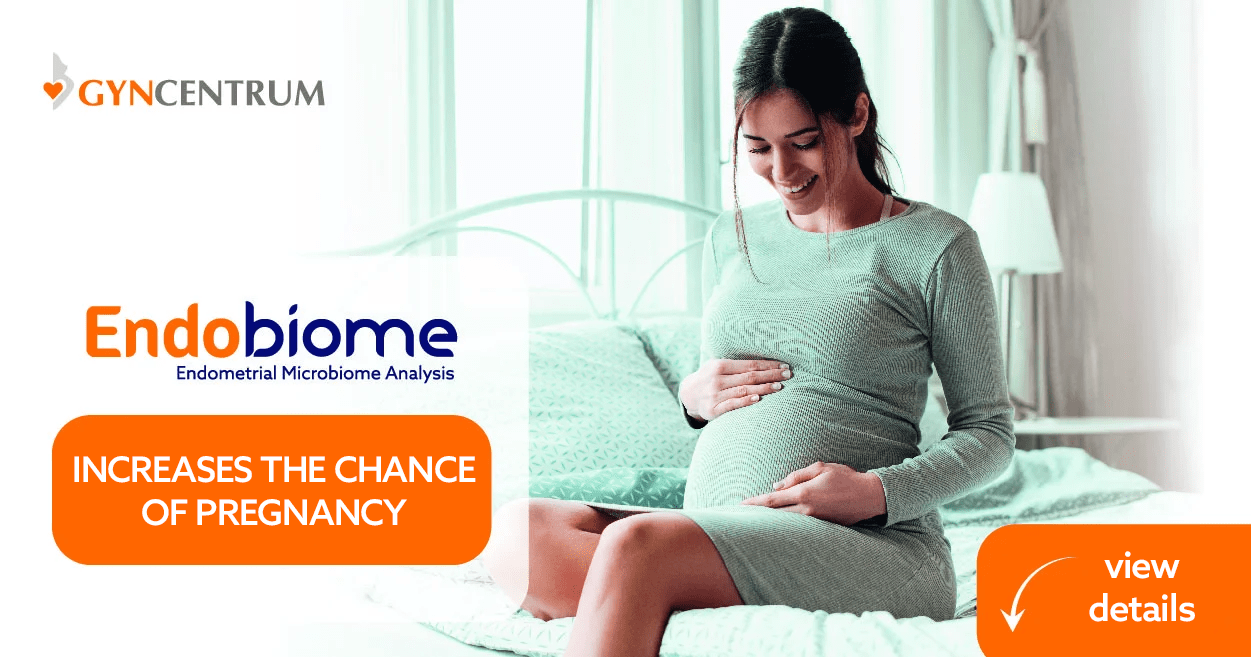We will contact you shortly to schedule a convenient appointment.
ENDObiome - endometrial microbiome
Study to assess the composition of the endometrial microbiome
Are you trying to have a baby? Are you preparing for an in vitro procedure? Have you experienced miscarriages? Do you have frequent intimate infections or chronic endometritis? Perform ENDObiome – a test that evaluates the composition of the endometrial microbiome and get a chance for successful treatment, pregnancy and childbirth.

Get your endometrial microbiome tested!
Gain the chance for successful treatment and pregnancy and childbirth
ENDObiome – analysis of the endometrial microbiome met. NGS
ENDObiome is a screening test that provides complete information on the microbial environment of the uterus. A balanced endometrial microbiome is an important factor in a woman’s intimate health, as well as successful embryo implantation and a normal pregnancy.
The test is performed using the Next Generation Sequencing (NGS) technique. The technique is based on sequencing the V3 and V4 subunits of the bacterial 16s rRNA gene, which makes it possible to accurately identify bacteria to genus and species. Examination of the microbiome by the NGS technique, unlike traditional microbiological methods, makes it possible to know the full battery profile of the endometrium, taking into account non-culturable strains as well, and allows to determine the percentage of bacteria identified in the sample.
The normal microbiome of the uterine environment, like that of the vagina, is dominated by Lactobacillus, the so-called lactic acid bacilli. This bacterium accounts for more than 30% of the total endometrial microbiome. Other bacteria residing on the surface of the endometrium are: Acinetobacter (9.07%), Pseudomonas (9.09%), Sphingobium (5%) and Vagococcus (7.29%) [1]. The presence of the above microorganisms in the right proportions is extremely important for a woman’s health and fertility.
Microbial balance provides protection against pathogen attack and enables the proper functioning of a woman’s reproductive system. Dysbiosis, on the other hand, is a disruption of the quantitative relations between microorganisms, often in favor of pathogenic bacteria. An abnormal endometrial microflora can impede embryo implantation, lead to pregnancy loss and premature delivery, and be associated with gynecological and obstetric conditions, i.e. chronic endometrial inflammation, intimate infections and even cancer of the reproductive organs.
ENDObiome – for whom?
Testing the endometrial microbiome is recommended especially for women who:
- are preparing for the in vitro fertilization procedure
- have experienced failures of the in vitro procedure due to problems with embryo implantation
- have experienced multiple miscarriages
- are having difficulty getting pregnant
- have experienced premature births
- have a diagnosis of endometriosis
- suffer from frequent intimate infections or chronic inflammation of the reproductive organs
Why perform an ENDObiome?
- ENDObiome allows assessment of the proportion of individual Lactobacillus species in the endometrial microbiota. When the result indicates dysbiosis or the presence of pathogenic species, the doctor can suggest appropriate treatment with antibiotics and/or probiotics.
- ENDObiome identifies the presence of pathogenic bacteria responsible for chronic endometritis, which is often asymptomatic and not detectable on ultrasound.
- ENDObiome increases the effectiveness of in vitro fertilization. The test helps determine whether the microbial environment of the uterus is optimal for embryo implantation. This allows the doctor to make an informed decision on whether to transfer the embryo or postpone it and initiate treatment to restore a normal microbiota.
- TheENDObiome gives a complete picture of the endometrial microbial profile, making it possible to modify the microflora with diet, appropriate supplementation or antibiotic therapy. This, in turn, increases the chance of embryo implantation, normal pregnancy and childbirth.
Sources:
[1] B. Macura, M. Majewska-Szczepanik, A.Strzępa, M. Szczepanik, Influence of the uterine microbiota on the health of a woman and her offspring, General Medicine and Health Sciences 2020, Vol. 26, No. 3, pp. 230-239.



